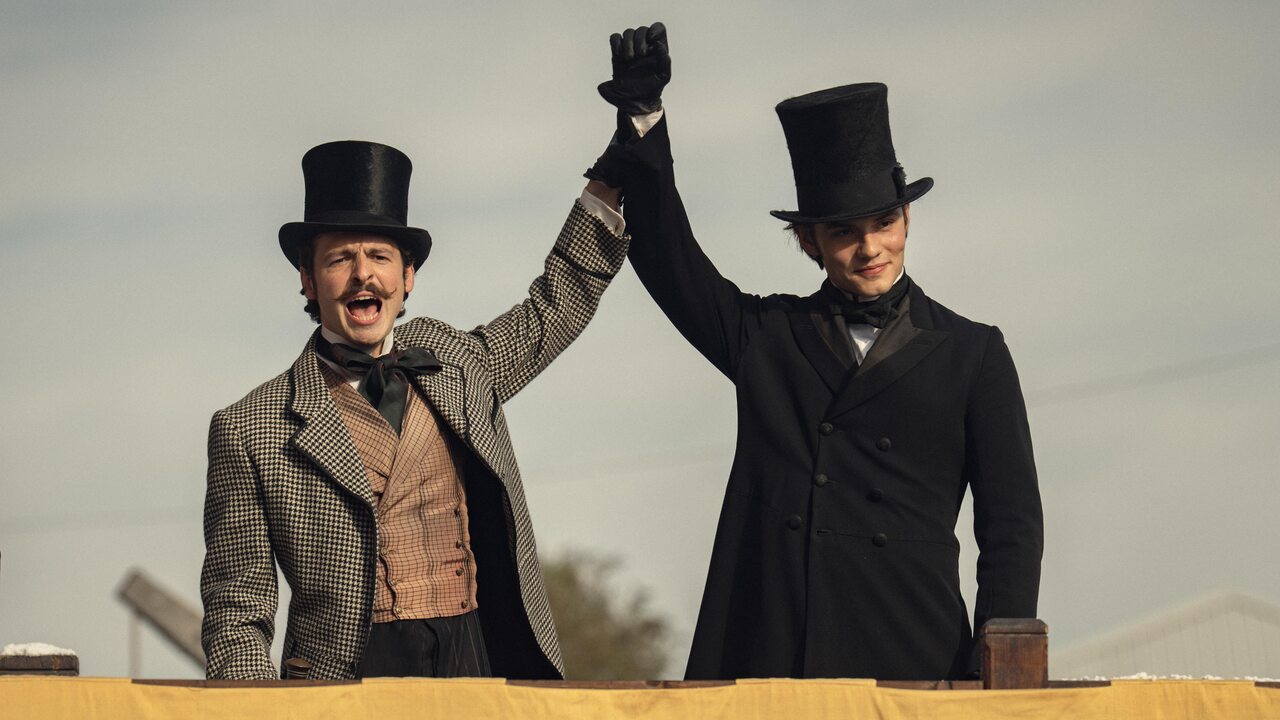
House of Guinness, created by Steven Knight, sets its tone almost immediately. It opens with the funeral of Sir Benjamin Lee Guinness (Graham Ashworth), though what's unusual about the event is that his corpse is positioned to appear as if he's smiling. The series also makes one thing clear from the beginning: it's not interested in using period-appropriate music. Knight, working with directors Tom Shankland and Mounia Akl, aims for a zany mood. When Ellen Cochrane (Niamh McCormack) reads a note containing a quote from Benjamin, Patrick (Seamus O'Hara) asks if the words actually belong to him. Ellen replies, "I don't know," which is already quite obvious. During a meeting between Lady Olivia Hedges (Danielle Galligan), Arthur Guinness (Anthony Boyle), and Aunt Agnes (Dervla Kirwan), Olivia so brazenly discusses private matters that Agnes seems close to having a heart attack. Later, when Anne (Emily Fairn) is giving birth, a maid enters the room to ask how much longer she'll take, since her husband needs to attend an event. And when servants enter a room to clean and find two characters in the midst of coitus, John Potter (Michael McElhatton) calmly instructs them to carry on with their work without disturbing the couple.
But there's a difference between a creator wanting to achieve something and actually achieving it. Knight's intentions are visible, but they don't come together to form a satisfying experience. One way to view House of Guinness is through the lens of our current world. In this historical drama, those who speak against the powerful are jailed and tortured. Wealthy men control the police, and though the story is set in the 1860s, the society it depicts is just as conservative as ours in the 2020s. For instance, men view women as best suited for domestic duties (the situation has improved today, but patriarchal thinking hasn't disappeared entirely). Everyone tries to project themselves as "respectable" citizens who follow rules of society; yet in private, those same rules are broken almost instantly (there are illicit affairs, secret sexual encounters, and scandalous deals). The Guinness family carefully cultivates a virtuous public image to gain trust, support, and fidelity—all in service of their brewery's success and Arthur's political ambitions. The series even tackles election fraud. How's that for modern parallels?
One can spend time drawing these connections, but they don't make the show any more enjoyable. House of Guinness suffers from the same problem that plagues many Netflix productions: too many ingredients spoil the dish. There are so many intriguing threads that Knight could have chosen just one and developed it into a tight, snappy two-hour film. Instead, the series repeats the common streaming pitfall—adding too many themes, subplots, and elements, then treating them as distractions. Take the streak of feminism, for instance. The show (at least, at first) aims to portray women as strong and independent, not particularly interested in finding a suitor. Anne is constantly disappointed by how she's undermined—first by her late father, then by her brothers. She eventually starts a charity, but the details are glossed over. How do she and her colleagues plan, schedule, or organize their work? When they decide to build homes for the underprivileged, Adelaide (Ann Skelly) simply shows up with completed plans and sketches, as if by magic. Meanwhile, the brothers' daily business dealings are portrayed with sufficient dramatic flair. The point is clear: the feminist subplot feels shallow and underdeveloped. Adelaide rejects marriage, yet falls for Edward (Louis Partridge). Ellen initially seems determined and strong, but is reduced to a pining lover. Even the bold and cheeky Olivia devolves into a weepy figure.
These things might have been forgivable if the central drama had more weight to it. Unfortunately, what we get is a hollow simulation of drama. The unfulfilled passions generate temporary intrigue, but these are quickly undermined by the next major plot event—whether a sibling rivalry, a court hearing, a failed business deal, or an election campaign scheming. Byron Hedges (Jack Gleeson), the bastard son, initially appears to be an agent of chaos but soon becomes a bland source of comic relief. And Benjamin (Fionn O'Shea)…well, he merely falls in and out of love with his drink. The larger issue with these six-to-ten-hour shows is that they rarely leave room for real engagement. They spell out every emotion and fill every blank, leaving viewers with little to do but gaze at the screen passively. No wonder second-screen viewing has become the norm. House of Guinness is no exception. As it progresses, it becomes increasingly predictable. By the finale, I had already guessed the season's cliffhanger. In the end, given all its dullness and staleness, perhaps what this series really needed wasn't a house of Guinness, but a house full of geniuses.
Final Score- [4/10]
Reviewed by - Vikas Yadav
Follow @vikasonorous on Twitter
Publisher at Midgard Times
Hi Everyone, after a due consideration, we have decided that we will be open for donations to help us in managing our website. We will be greatful for any kind of amount we receive. Thanks!
— Midgard Times 🎬 (@Moviesr_net) January 4, 2026
PayPal- [email protected] pic.twitter.com/DlNNz5Npm5
Get all latest content delivered to your email a few times a month.
Bringing Pop Culture News from Every Realm, Get All the Latest Movie, TV News, Reviews & Trailers
Got Any questions? Drop an email to [email protected]